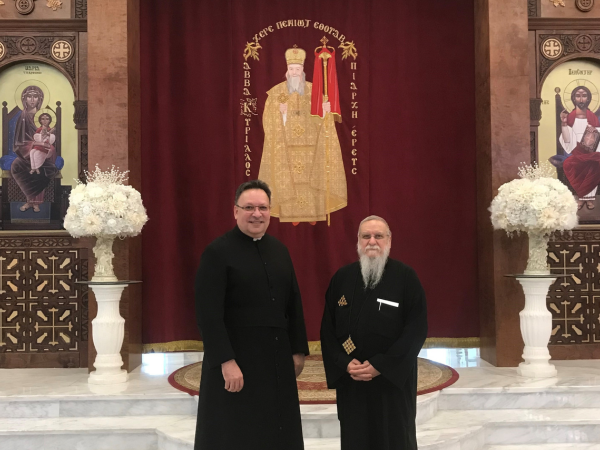Christian Unity Week begins on Jan. 18 and continues through Jan. 25. During this time, the Church observes the Week of Prayer for Christian Unity.
It is lovely that after the season of joy and hope that is Christmas, we pray for the restoration of Christians under one Church as it was from the beginning.
The healing of the Christian family begins with hope in Jesus Christ who founded the Church on the confession of St. Peter.
There have been two major attempts to restore communion between the Catholic and Eastern Orthodox Churches.
One was through the Council of Lyon (1274 AD) and the other was the Council of Florence (1429 AD). Neither was successful.
With the break of the Protestants in the 16th century, the main attempt at healing was through the Second Vatican Council and in particular the document that it produced, the Decree on Ecumenism. The great Council of Trent (1543 AD) was called to respond to the divisions and questions of Luther, Calvin, Zwingli and others. However, the main purpose of the council was to explain Catholic doctrine and to defend the deposit of faith. The crisis didn’t allow for any significant reconciliation.
Here we are, so many centuries later, still trying to bring Christians back to the one expression of Church that Christ intended. In an echo of St. Paul’s own reproach of the Corinth Community (1 Cor 1:13), Pope Francis in 2014 said, “The divisions that exist among Christians are a source of pain and scandal and damage the credibility and work of spreading the Gospel.” Christian division causes confusion and in history even violence.
Perhaps there are a few points that will help us understand the reason why the Church embraces the ecumenical movement, how she works toward the full restoration of all Christians.
■ The Church discerns that she has a special responsibility as the Church founded by Christ, to work toward the restoration of what was established by Him. She remembers that for over 400 years after the Ascension of Christ into Heaven, there was only one Church. The break between the East and the West didn’t happen until almost 1000 years later. Regarding one united Church, she is convinced that if it was before, it can again.
■ Ecumenism is not about creating a new Church. Authentic ecumenism is not about creating but restoring what Christ first gave to St. Peter, “You are Peter and upon this rock I will build My Church and the gates of hell will not prevail against her.” (Mt 16:18)
■ The Catholic Church contains in herself the fullness of what Christ intended His Church to be (Catechism of the Catholic Church: paragraph 820).
■ The Church is committed to reclaiming the unity that was given her by Christ. She must purify herself. She must ask for forgiveness of past sins committed by her children in the quest for reconciliation.
■ What will probably remain the same: 1) Both Orthodox and Catholic Churches will retain their unique institutions, liturgical rites, traditions and piety. 2) Each Church will rule themselves in accordance with their own established disciplines. 3) Patriarchs will still hold authority over their own Churches but with an agreed upon understanding of the role of the Catholic pontiff.
■ What will need to be reconciled: 1) The place of the Pope as “first among equals” is not enough. Pope Benedict suggested that the Catholic Church could accept that Churches in union would rule themselves while being in communion with the Catholic Church. If there were insurmountable problems or quarrels, these would be brought to the See of Rome. The Pope, in these rare circumstances, would be the final arbiter. There is evidence that in the Early Church this occurred. 2) The Filioque (and from the Son) would be settled: how does the Holy Spirit proceed from the Father? 3) Reception and acceptance by the Orthodox of the doctrines of the Immaculate Conception and Purgatory would need to happen. These are the most notable challenges to reunion. Many theologians believe that the real difficulty lies in the role of the pope. With the many forms of Protestantism, there would be many more challenges to reunion, especially in the moral life.
The work may seem insurmountable, but the Catholic Church remains convinced that with the help of the Holy Spirit miracles can happen. Christ before His passion and death prayed that the Church would be one (John 17:21). We have a solemn responsibility to work toward recovery of the vision and original plan of the Lord.
Christian Unity Week in January gives us the opportunity, through action and prayer, to heal divisions that still continue to wound the Christian family.

